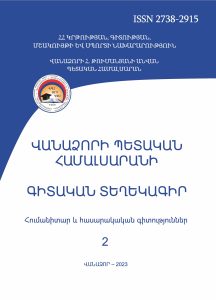Features of Ethnic Self-Consciousness of Servicemen (Military Personnel)in the Post-War Period
Scientific Proceedings of Vanadzor State University Humanitarian and Social Sciences (ISSN 2738-2915)
2023 vol 2
Features of Ethnic Self-Consciousness of Servicemen (Military Personnel) in the Post-War Period
Garik Hovakimyan
Summary

Key words: ethno-identity, adaptation of servicemen, public attitude, end of a war, post-war challenges, victory-defeat, nationalism, revanchism, globalism, denationalization
Based on the theoretical level, this article analyzes the totality of the main characteristics of military personnel from a socio-psychological point of view in the context of ethnic self-consciousness:
- The need for rehabilitation and the return to civilian life is expressed in the restoration of the daily routine: everyday life of military personnel who returned from the war (includes restoration to the family life and daily activities).
- Changes in the perception of the enemy: during the war, the enemy is realized as an external threat, and the military personnel develop a unique ethnic identity by opposing their own personality and their group to the enemy.
- Changes in the military-political situation in the post-war period may lead to a change in the ethnic identity of servicemen. For example, changes in internationally recognized boundaries, political structures, or social institutions may affect their sense of belonging to their ethnic group.
- Military conflicts and the post-war period can also lead to a reassessment and transformation of one’s own ethnic identity. Combatants may identify themselves not only with their ethnic group, but also with the wider community.
